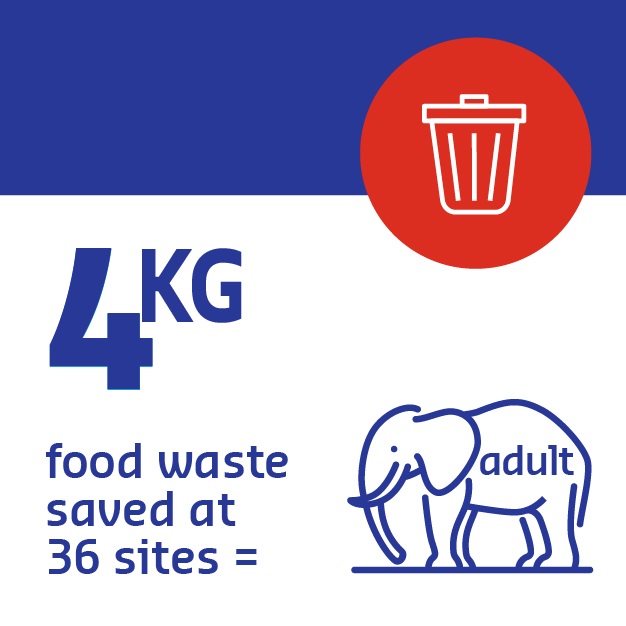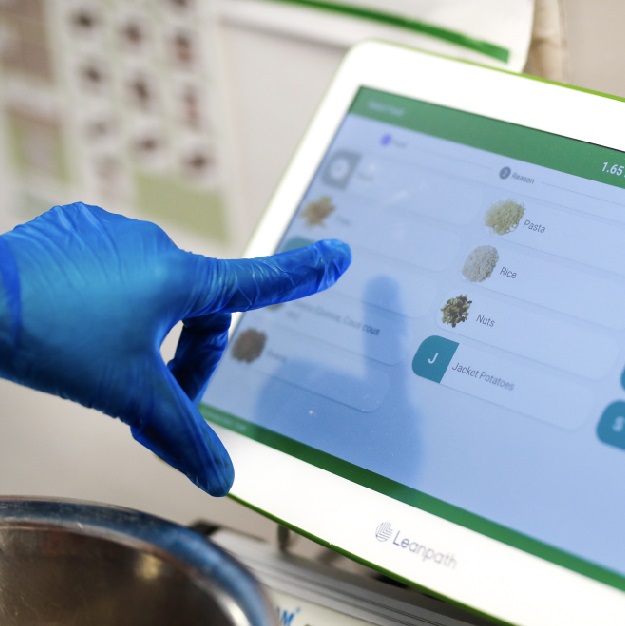Wastewatch is a measurement system that allows kitchen staff to understand what’s thrown away, and why, in real-time. This enables them to easily identify efficiencies, and make informed choices about menus and operating procedures, all supported by data. Oasis Community Learning deployed WasteWatch at 36 academies in 15 months and are set to introduce it at a further six sites.
Food waste reduction at Oasis Academies so far
Since April 2021, Oasis Community Learning has deployed WasteWatch at 10 of their academies across the country. These schools have so far seen a 10% reduction in food waste, collectively saving £1,126 and preventing four metric tonnes of food from being wasted – the weight of an Asian Elephant.
Not only does the food saved from going to waste equate to 1,064 meals, the programme has also prevented over 14,000 bathtubs of water from going down the drain.
Changes made as a result of using WasteWatch
 The Oasis Community Leaning team assisted the UK rollout of WasteWatch by creating how-to videos for new sites to follow when setting up their systems.
The Oasis Community Leaning team assisted the UK rollout of WasteWatch by creating how-to videos for new sites to follow when setting up their systems.
Kitchen staff – who reported being surprised at the sheer volume of food waste – made changes in the way fruit was distributed and displayed over the course of the programme and adjusted their methods for vegetable preparation.
This includes roasting vegetables unpeeled, which not only cuts waste by 58% but means that key vitamins and nutrients are maintained. At the Oasis Academy Long Cross in Lawrence Weston, Bristol they reduced their overuse of potatoes by 65%.
There was also less inventory spoilage because WasteWatch tracks overspend and wastage to ensure that stock level management is as effective as it can possibly be.
Kitchen staff are trained how to deal with food waste so it can be effectively processed. This means making sure foodstuffs are properly segregated so remaining waste can be used in school composting bins and then used in their on-site vegetable gardens. Other food waste is separated and treated through anaerobic digestion which diverts waste away from landfill, reduces landfill gas emissions and ensures nutrients are recycled back into the food system.
Future initiatives planned
 A future trial of carbon labelling with Klimato will promote good environmental food choices and further educate students on the environmental impact of their meals.
A future trial of carbon labelling with Klimato will promote good environmental food choices and further educate students on the environmental impact of their meals.
Sites are also looking forward to the implementation of Drive, which will be installed from April 2022. Drive is a new process that saves staff from the time-consuming manual processes of food management, with tailored menus that meet financial targets and customer quality expectations, and recipes linked to available products. This will further encourage efficient food production and provide further data informing useful reductions and effective ordering choices.
The Oasis Community Learning family is looking forward to using the data collected by this technology to continue the reduction in food waste. Tracking statistics are being used as part of strategic planning and are being reviewed at Oasis’s sustainability forums. Onsite staff are also being encouraged to give more accurate advanced pre-order meal numbers to reduce prepared expired and over-production impact.
The programme has been a huge success at the Oasis academies where it currently operates, but at Sodexo, we’re aware of the collective changes that still need to be made to tackle food waste. We will continue to refocus our priorities and work collaboratively with our clients to make a positive difference in the fight against climate change and hunger.
At Sodexo, we’re always looking for new opportunities to further the conversation and drive action on waste reduction within our business and for our clients. If you have any questions, please contact Sodexo's Corporate Responsibiltiy team.
